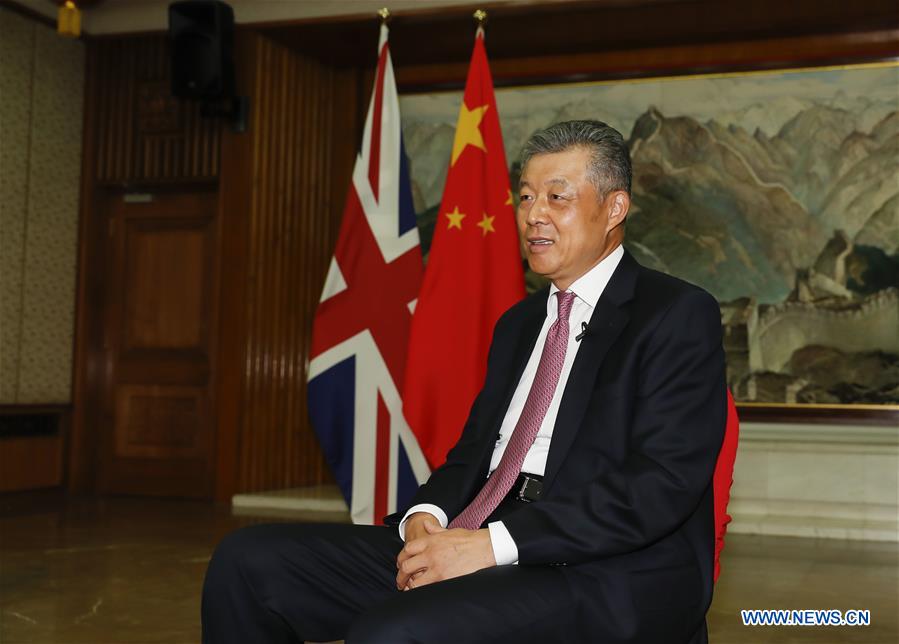
Chinese Ambassador to Britain Liu Xiaoming speaks in an interview with Xinhua in London, Britain, Sept. 11, 2019. (Xinhua/Han Yan)
by Xinhua writers Gu Zhenqiu, Jin Jing
LONDON, Sept. 16 (Xinhua) -- China and Britain foresee huge potential for cooperation in such areas as financial services, technological innovation and the Belt and Road Initiative (BRI), with China's further drive to reform and opening-up, Chinese Ambassador to Britain Liu Xiaoming said.
The ambassador noted that China and Britain have long played a leading role in initiating cooperation between the East and the West, and Britain is the first major Western country that issued the RMB sovereign bonds, and the first to join the Asia Infrastructure Investment Bank.
The Shanghai-London Stock Connect mechanism launched in June was the first of its kind to directly link the Chinese and European markets, bringing together two of the world's largest capital markets, he said in a recent interview with Xinhua ahead of the 70th anniversary of the founding of the People's Republic of China (PRC), which falls on Oct. 1.
In particular, the BRI would inject new dynamism into China-Britain ties as Britain would be looking for new markets and new cooperative opportunities in post-Brexit era, he added.
The BRI, proposed by China in 2013, aims at building a trade, investment and infrastructure network connecting Asia with other parts of the world along the ancient Silk Road trade routes and beyond. More than 150 countries and international organizations have signed BRI cooperation documents with China.
Former British Chancellor of the Exchequer Philip Hammond has called Britain a "natural partner" of China in advancing the BRI and proposed combining the best of Chinese manufacturing, engineering and construction with the best of British expertise in project design and legal, technical and financial services.
Meanwhile, China and Britain, both nations with a long history and profound culture heritage, have witnessed increasing people-to-people exchanges, Liu said.
The enthusiasm of Mandarin-learning has continued to rise, said Liu. There are currently 29 Confucius Institutes and 163 Confucius Classrooms across Britain, ranking the highest in Europe.
More than 600 British schools have launched Chinese curriculum. Last year, Mandarin has overtaken German as the third most popular foreign language in the Britain's college entrance exams, Liu noted.
Chinese culture has also been more widely appreciated in Britain, said the ambassador. For instance, the Chinese Spring Festival celebration at the Trafalgar Square in central London is the largest of its kind outside Asia, drawing more than 700,000 visitors each year, he said.
The ambassador acknowledged that challenges remain as the world is facing rising unilateralism and protectionism, possible disruption of supply chains and rising pressure on a global economic downturn.
Chinese businesses in Britain are subject to uncertainties caused by Brexit while the trade policy of a post-Brexit Britain has yet to be defined, said Liu.
However, China and Britain, both supporting free trade and multilateralism and sharing more common ground than differences, should make joint efforts to translate opportunities into tangible results, said the ambassador.
While China-Britain relations have advanced by leaps and bounds over the past 70 years, a "Global Britain" in post-Brexit era should value even more its ties with emerging markets and emerging economies like China, Liu told Xinhua.
This year also marks the 65th anniversary of the establishment of diplomatic relations between the PRC and Britain at the level of charge d'affaires.
In 2018, bilateral trade reached more than 80 billion U.S. dollars, 260 times the figure when the ambassadorial relationship was established in 1972.
Britain is now China's second largest trading partner within the European Union (EU). It has also become China's second biggest investment destination and source of capital inside the EU, according to China's Ministry of Commerce.